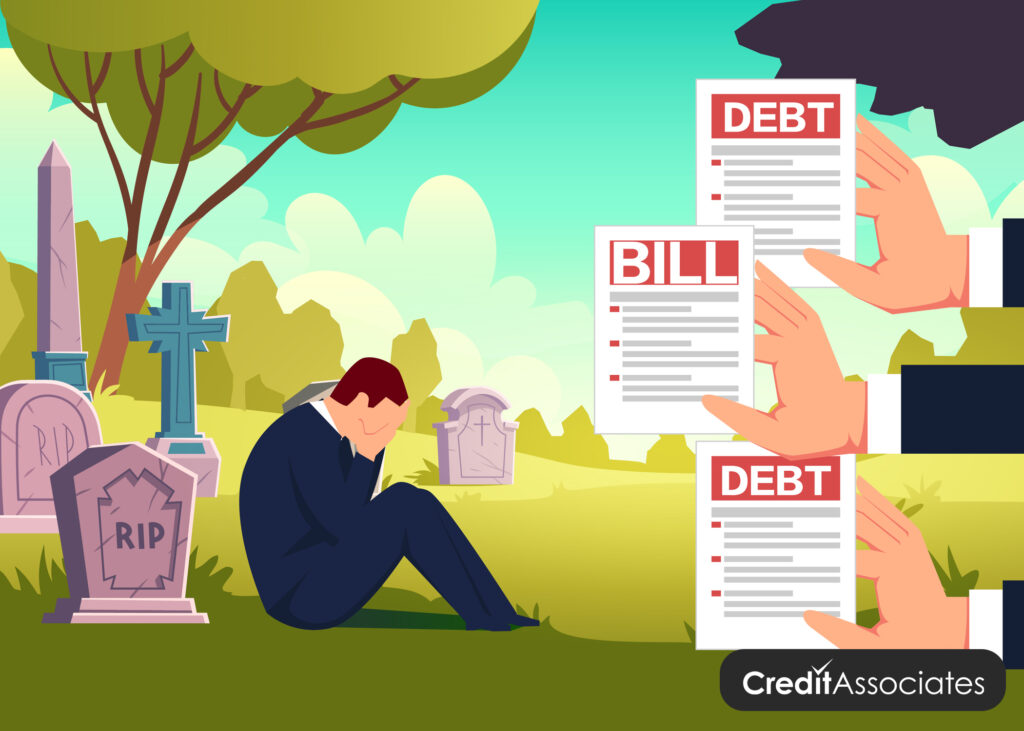What Happens to Your Credit Card Debt When You Die?
Unfortunately, we don’t live forever, so it’s prudent to plan ahead for your finances to be in order when you pass away. ‘When you die, what happens to your debt?’ is something we hear often. Will someone else, like next of kin, be responsible for paying it off? Or will it be erased? And, if so, what debts are forgiven when you die?
Having answers to these questions is essential, especially if you have financial obligations that might take you years to resolve.
In this article, we’ll talk about what happens to your debts after you die, what debts are forgiven at death, and who will shoulder the burden of your unresolved obligations.
Who is Responsible for Your Debt After Death?
The responsibility of paying for your debts after you die falls on your estate, which is composed of all of the assets that you own post-mortem. Your estate value is determined during the probate process, during which an executor should notify the credit bureaus of your passing, resolve your debts and then distribute the remaining inheritances according to your will.
Secured vs Unsecured Debts
Secured debt is always backed by an asset, so they have a repayment guarantee built-in. Generally, these debts resolve themselves with the collateral you originally established. Unsecured debts (such as credit cards and medical bills) go through the probate process and will eventually be forgiven if your estate can’t pay for them.
Community Property States
In community property states (like California and Texas, to name a few), the spouse will legally inherit your outstanding debt, whether or not they were aware of it. However, they will only be responsible for the debts you incurred during the marriage.
Filial Responsibility Laws
Most states have filial responsibility laws, which place the burden of paying any debt incurred through hospital bills or long-term care on your children. However, this law is rarely enforced.
Timeshares
Most timeshares have perpetuity clauses in the contract. Thus, any financial obligations, like maintenance fees, will fall to your heirs.
What Can Creditors Take?
Knowing what debts are forgiven at death is one thing, but it’s also vital to know what assets creditors can take from your or your heirs. As a rule of thumb, creditors can claim anything that goes towards your estate.
However, anything that goes to your beneficiaries is off-limits, including your life insurance plan, funds from your retirement account, and living trusts. If your beneficiaries are also deceased, this rule does not stand. Unless you change your beneficiaries before you die, their benefits will pass on to your estate (where creditors can claim them.)
Debt Collectors and When Family Can be Held Responsible for Debt
The reason why it’s important to know what happens if you die with debt is because debt collectors might go after your family members – even when they legally can’t. As mentioned, debt doesn’t automatically pass to your surviving family, so debt collectors cannot legally harass them. There are, however, exceptions to this rule. If a family member co-signed or co-owns a loan or credit card, then the debt will pass on to them.
Another potential danger is if your family members distribute assets or gifts from your estate to other relatives, either before you die or during probate. During these instances, creditors can go after the recipients and have those assets put back into the estate for them to claim.
Why You Need Life Insurance
If you’re worried about what happens to credit card debt when you die, a life insurance plan is the best way to relieve your heirs of this pressure.
The idea is simple: you get a term life insurance that includes a death benefit and term length that match your outstanding debt. For example, if you have a $400,000 mortgage for 35 years, you should get a life insurance plan that covers that value. Then, you must name your beneficiaries. If you don’t list any beneficiaries, the life insurance will return to your estate.
When you pass away, your beneficiaries can receive the death benefit directly. Hence, creditors cannot claim the life insurance, guaranteeing that the value of the inheritance you leave your heirs remain intact.
Don’t Leave It to Chance
It’s important to know what happens to debt after you die, but the best approach is not to have debt at all. Paying financial obligations off as quickly as possible is the best gift you could leave your loved ones. If you need help, the debt reduction experts at CreditAssociates are here to help. Contact us today by filling out our online form and a Debt Consultant from our team will be in touch.
